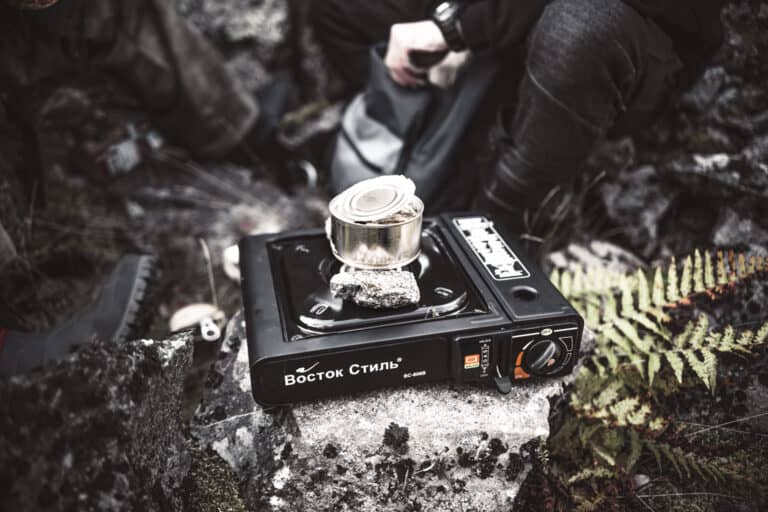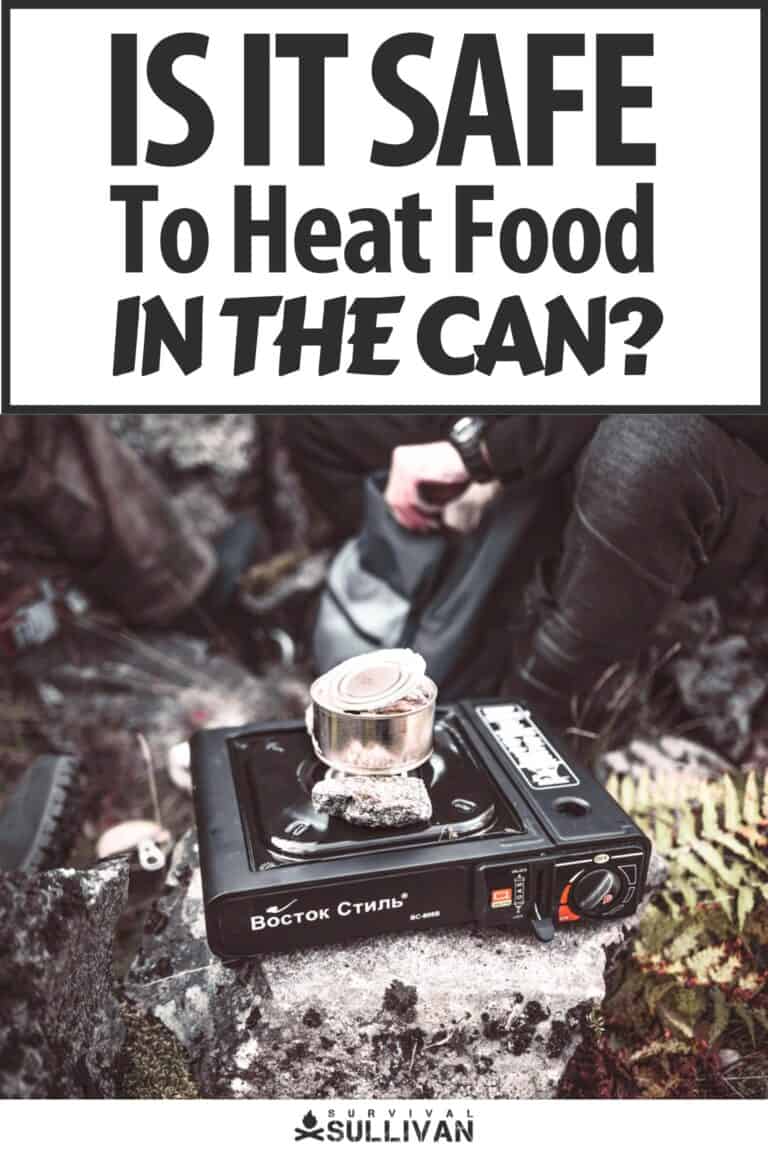Canned food has been a staple in pantries and has seen lots of people through hard times.

Not only are they compact, but the shelf life of canned food is also long-lasting. This makes it ideal for preppers and survivalists alike.
Everything can come in a can, from meat to soups and vegetables. The methods for canning have primarily stayed the same, with materials used changing slightly.
One common debate is whether or not heating up the food in the can is good for your health.
Some say that it’s perfectly fine since we cook in metal, others are concerned about what is in the can itself that could cause harm to our bodies. So what’s the verdict?
No, you should not heat up your food in the can it came in. Cans made of aluminum and steel have health risks when heated, and linings used inside them might contaminate the food inside.
In a pinch, cooking your food in the can it comes will work just fine for the contents inside.
In fact, consuming food that’s been heated in the can may not have any immediate negative effects on your body.
However, prolonged consumption could have adverse effects on your health. It’s important to understand what kinds of chemicals can be found within the can before you make any choices.
Why Shouldn’t You Heat Food In The Can?
Some manufacturers advise not cooking their products directly inside the can because of how heat interacts with the metals and chemicals used.
The whole point of canning is to keep the food from spoiling and is actually just meant for storage.
Manufacturers have designed the can to do just that and nothing more.
The general rule of thumb is that food cans are made with steel and beverage cans are made with aluminum. There are companies that line their cans as a preservative method.
Also remember to keep your cans in a cool, dark space to maximize shelf life. Cans that sit out in the sun have a chance to spoil much faster.
What Happens When You Heat Up A Can Of Food
Food-grade cans are made with steel which has minimal leaching when heated up.
Nickel and Chromium are released in small amounts in your body and can cause cutaneous adverse reactions such as dermatitis. Aluminum cans, such as those found in beverage containers, can also cause health problems.
Aluminum is a soft metal that has been linked to serious brain conditions. Theories across the community all say that aluminum can leach far more heavy metals than steel.
Some steel cans also have a thin layer of tin to help the can from corroding when exposed to moisture over a long period of time.
Metals aren’t the only thing to be aware of leaching into your food.
Many processing facilities line the inside of the can with a food-grade epoxy that has been found to contain compounds such as BPA (Bisphenol-A) which is a plastic hardener known to cause issues within the body, such as reproductive problems.
There are companies that use a BPW-free lining that is derived from plant resins, but the costs are incredibly high compared to the standard practices.
This is why most companies go this route in their canning processes.
There are groups around the world trying to change this practice as it is also terrible for the environment as plastics don’t break down for a long time.
How To Heat Canned Food In Survival Situations
This will be prefaced with a warning: heating food in a can has the potential to harm you, regardless of who says you can do it.
Do the research and make your own decision on doing this.
If you find yourself without a way of heating the food up in a dish, the can when warmed gently could fix that problem for you.
But only as a single-use item. Using it more than once could increase the probability that something nasty is going to leach into your food.
It’s also a good idea to open your cans because a closed can might explode as there is no room for any expansion when the food starts to heat up.
If possible, try not to heat the can directly on a flame, this also applies to putting a can directly on a fire. Elevate the can above a campfire using a tripod or a small grill.
The direct flame will scorch the can and introduce various metals and chemicals into your food.
If you use the radiant heat of coals to gently warm the can it’ll reduce the risk of leaching into your food.
You also run the chance of burning the food inside if you leave the can directly on the flame.
Using a propane or butane camp stove? You should be okay heating the can over one of these kinds of stoves.
The flames produced by these fuels have a greater heat transfer as there is direct contact with the can.
Some people use the power of the sun to heat up their canned food.
The easiest way would be to drape a black cloth or some other solar absorbent material over the can and let it heat up naturally.
This method requires consistent sunlight but is a gentle way to heat up your canned food.
Final Thoughts
While it is possible to heat your canned food up in the can it was processed I, it is generally not a good idea to introduce it into your regular diet.
A common practice that should be adopted is to prepare for situations such as this. You can keep a small skillet or lightweight pot in your vehicle or backpack.
Ironically, if you have canned food in your pack then you generally will pack something to cook it in.
Of course, there will be situations where you can’t avoid heating it up in the can but as long as you do it low and slow there shouldn’t be any issues.


Perrin is an adventure guide and naturalist currently living a nomadic life in the Canadian wilderness. His education and expertise is in wilderness survival and wildlife tracking. He enjoys teaching people about the outdoors and has managed large groups on expeditions.
With several accredited certifications, including being a wilderness first responder and a leave no trace expert, Perrin believes it is important for all of us to reconnect with the natural world.

Interesting article. When I was in the Marine Corps in the early 70’s we would heat our “C” rats by making a stove from a folded cracker can, place a heat tab inside and then heat the “yummy” stuff of whatever we had in the can it came in. Maybe that’s why I’m not mentally right today according to my wife?
I can’t ever remember not heating my C-Rats in the can. If they were heated at all.
Many newer cans have lining that COULD melt or out-gas or leach chemicals into the food if heated. A longer term concern that immediate survival needs.